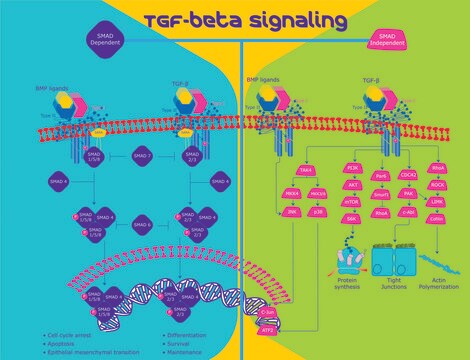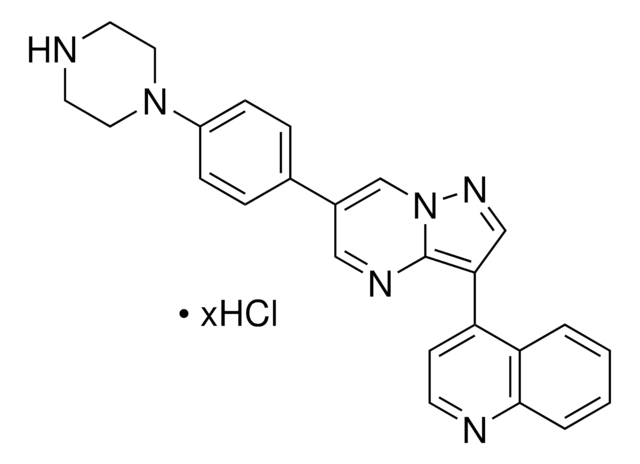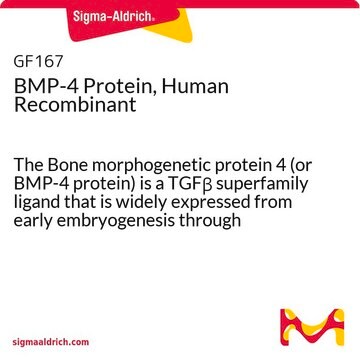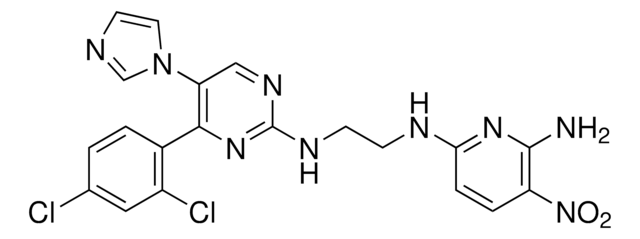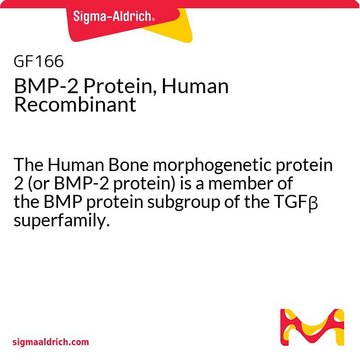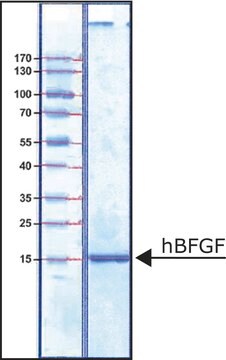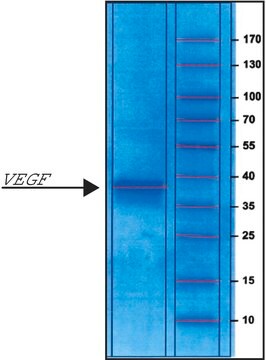推荐产品
产品名称
Bone Morphogenetic Protein 4 human, BMP-4, recombinant, expressed in HEK 293 cells, HumanKine®, suitable for cell culture
生物源
human
品質等級
重組細胞
expressed in HEK 293 cells
化驗
>95% (SDS-PAGE)
形狀
lyophilized powder
效力
≤10 ng/mL EC50
品質
endotoxin tested
分子量
dimer 34 kDa (glycosylated)
包裝
pkg of 10 μg
pkg of 100 μg
pkg of 1000 μg
儲存條件
avoid repeated freeze/thaw cycles
技術
cell culture | mammalian: suitable
雜質
<1 EU/μg Endotoxin level
UniProt登錄號
儲存溫度
−20°C
基因資訊
human ... BMP4(652)
正在寻找类似产品? 访问 产品对比指南
一般說明
BMP are members of the TGF-β superfamily of cytokines that affect bone and cartilage formation. Similar to other TGF-β family proteins, BMPs are highly conserved across animal species. Mature BMPs are 30-38 kDa proteins that assume a TGF-β-like cysteine knot configuration. Unlike TGF-β, BMPs do not form latent complexes with their propeptide counterparts. Most BMPs are homodimers, but bioactive natural heterodimers have been reported.
Bone morphogenetic protein 4 (BMP4) is a member of the transforming growth factor-β (TGF-β) superfamily. It is a glycoprotein with cysteine knot and exists as homodimer corresponding to a molecular mass of 26 kDa. BMP4 is mapped to human chromosome 14q22.2. BMP4 is expressed in embryonic and adult tissues. It is synthesized in the endoplasmic reticulum and in Golgi, it undergoes posttranslational modifications.
應用
Bone morphogenetic protein 4 human has been used to induce cardiac myogenic differentiation in bone marrow-derived mesenchymal stem cells (MSC).
生化/生理作用
BMPs create an environment conducive for bone marrow development by stimulating the production of specific bone matrix proteins and altering stromal cell and osteoclast proliferation. In addition to stimulating ectopic bone and cartilage development, BMPs may be an important factor in the development of the viscera, with roles in cell proliferation, apoptosis, differentiation, and morphogenesis. BMPs also appear to be responsible for normal dorsal/ventral patterning. BMP-4 specifies the development of ventral structures (e.g., skin from ectoderm and connective tissue/blood from mesoderm). Dorsal structures (nervous system and muscle) apparently appear when BMP-4 signals are interrupted through the activities of binding proteins. BMPs are found in tissues that induce bone or cartilage growth, such as demineralized bone and urinary epithelium.
Cellular responses to BMP-4 are mediated by the formation of hetero-oligomeric complexes of type I and type II serine/threonine kinase receptors, which play significant roles in BMP binding and signaling. Two BMP type I receptors and one BMP type II receptor have been identified. Both BMP type I receptors bind BMP-4 with high-affinity in the absence of BMP receptor type II.
Cellular responses to BMP-4 are mediated by the formation of hetero-oligomeric complexes of type I and type II serine/threonine kinase receptors, which play significant roles in BMP binding and signaling. Two BMP type I receptors and one BMP type II receptor have been identified. Both BMP type I receptors bind BMP-4 with high-affinity in the absence of BMP receptor type II.
Bone morphogenetic protein 4 (BMP4) is essential for auditory neurogenesis. It also mediates the mesenchyme formation and acts as a key differentiation factor for hematopoietic and nerve cells. The BMP4 based signaling is upregulated in both. oligodendrocyte progenitor cells (OPCs) neural precursor cells (NPCs). Cellular responses to BMP-4 are mediated by the formation of heterooligomeric complexes of type I and type II serine/threonine kinase receptors, which play significant roles in BMP binding and signaling. Frameshift mutations in the BMP4 is implicated in the developmental anomalies especially with optic vesicle and digits. BMP4 mutations have also been associated with orbicularis oris muscle (OOM) and lip morphological defects.
外觀
Lyophilized from a 0.2 μm filtered solution of 2x PBS + 6% Ethanol.
準備報告
This Bone Morphogenetic Protein-4 (BMP-4) is expressed in human HEK 293 cells as a glycosylated 34 kDa homodimer. Production in human HEK 293 cells offers authentic glycosylation. Glycosylation contributes to stability in cell growth media and other applications. Mature human and mouse BMP-4 are 98% and 100% identical, respectively, to mature rat BMP-4 in their amino acid sequence.
分析報告
The specific activity was determined by its ability to induce alkaline phosphatase production in a dose response to BMP-4 in the ATDC-5 cell line (mouse chondrogenic cell line).
法律資訊
HumanKine is a registered trademark of Proteintech Group, Inc. and Humanzyme, Inc
儲存類別代碼
11 - Combustible Solids
水污染物質分類(WGK)
WGK 3
閃點(°F)
Not applicable
閃點(°C)
Not applicable
其他客户在看
Bone morphogenetic protein 4 promotes the survival and preserves the structure of flow-sorted Bhlhb5+ cochlear spiral ganglion neurons in vitro
Waqas M, et al.
Scientific reports, 7(1), 3506-3506 (2017)
Bone morphogenetic protein 4 signalling in neural stem and progenitor cells during development and after injury
Cole AE, et al.
Stem Cells International, 2016 (2016)
Mutations in BMP4 cause eye, brain, and digit developmental anomalies: overlap between the BMP4 and hedgehog signaling pathways
Bakrania P, et al.
American Journal of Human Genetics, 82(2), 304-319 (2008)
Mutations in BMP4 are associated with subepithelial, microform, and overt cleft lip
Suzuki S, et al.
American Journal of Human Genetics, 84(3), 406-411 (2009)
Induction of cardiac myogenic lineage development differs between mesenchymal and satellite cells and is accelerated by bone morphogenetic protein-4
Grajales L, et al.
Journal of Molecular and Cellular Cardiology, 53(3), 382-391 (2012)
我们的科学家团队拥有各种研究领域经验,包括生命科学、材料科学、化学合成、色谱、分析及许多其他领域.
联系技术服务部门

